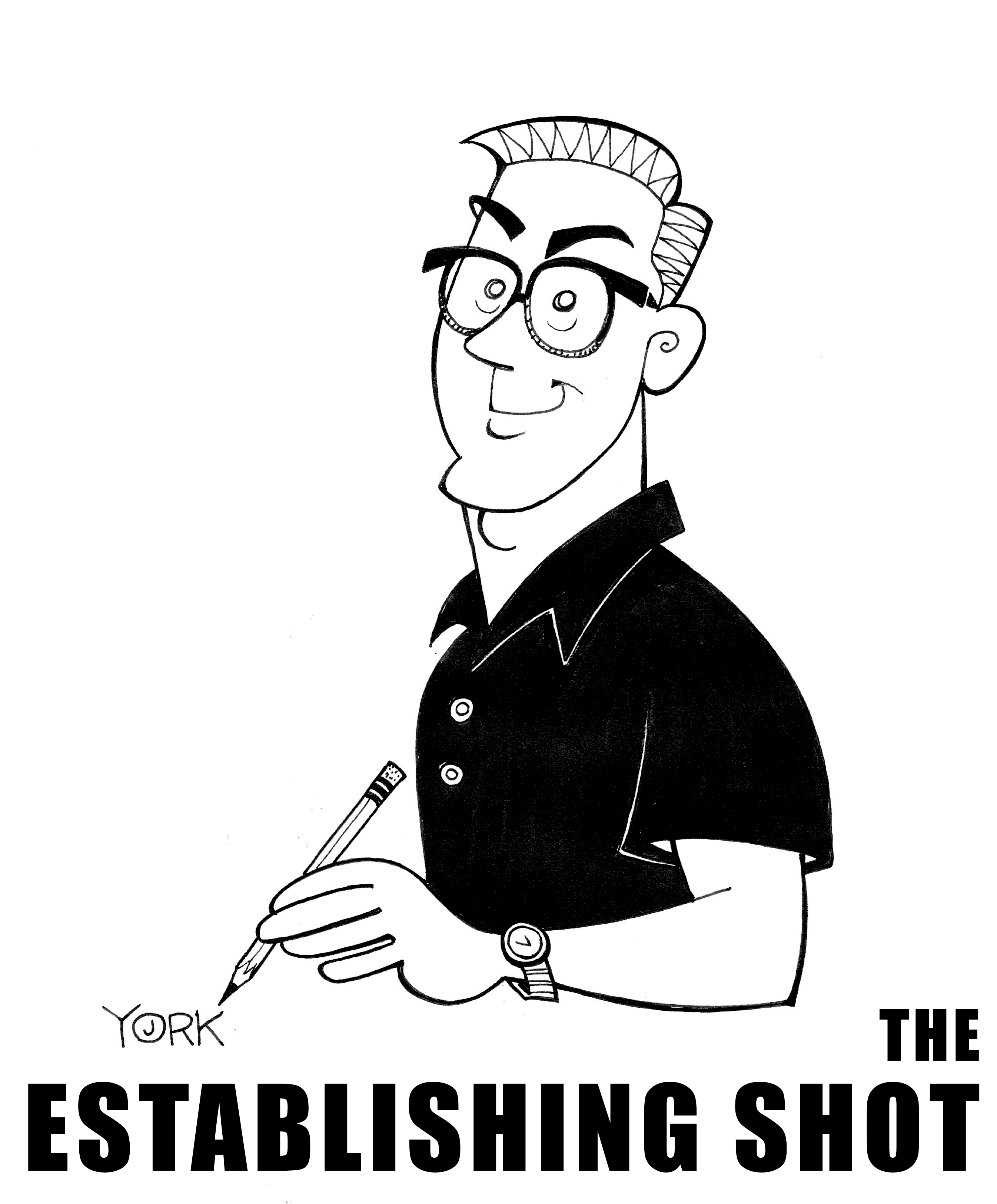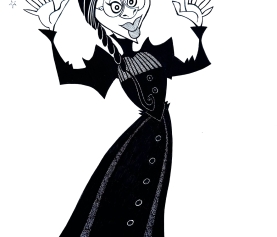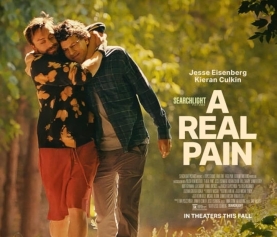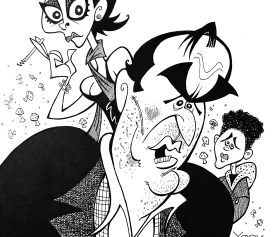
Multi-hyphenate Ryan Murphy is getting all kinds of blowback for some facts and fiction he’s blended in writing/directing/producing his new Netflix miniseries MONSTERS: THE LYLE AND ERIK MENENDEZ STORY. He’s likely laughing all the way to the bank as his show, based on the famed parricide crimes in the early 1990s, is a huge hit on Netflix since it premiered September 19th. I’m sure Murphy also realizes, as should any viewer, that such adaptations often take license with the truth. The bigger questions are whether the show is worthy of watching and indeed, by and large, a fair representation of what occurred. The answer to both is a resounding yes.
Murphy & company should be very proud of all that their miniseries accomplishes. It is utterly compelling dramatically from first minute to last, with lots of verve in every frame of its complex telling of the horrific tale. The show is well-acted and produced with A+ production values top to bottom. Plus, regarding the subject of accuracy, frankly, it nails most of the facts of the case with extreme clarity. On the other hand, it cleverly leaves some of the disputed facts to a RASHOMEN-style presentation of varying ideas. (More on that later.) And for those griping on social media about how Murphy addresses the brothers’ sexual abuse defense put forth during the trial to justify their homicides and is still clung to as a viable excuse today, well, all I say to that is this…why is anyone steadfastly believing anything that such liars have to say?
The brother’s monstrosity may be the hardest part to swallow for the naysayers, including Erik Menendez who’s bitching about various inaccuracies from his POV now in his 34th year of incarceration, but the facts are these: Lyle and Erik Menendez killed their parents and then lied about being the culprits for months after. The only reason they were tried was due to their psychiatrist’s girlfriend who went to the authorities with what the brothers confessed during their therapy sessions, not because of any such guilt or admissions on their part to the police. As for the sexual abuse angle, well, was not brought forth by the brothers until after they had been incarcerated for months and months. Up until then, the two bad seeds had demonstrated over and over again to be greedy, smug brats: robbing wealthy homes, lying about that, treating many as unkindly as they accused their parents of, not to mention using people, spending money after their parents murders like it was going out of style and more. They were bad people. Entitled. Arrogant. Lazy.
At the time, to many in the press, the law, and John Q. Public, went so far as to think that their “abuse excuse” played like a scheme to avoid California’s death penalty. It also begged questions about why the adult sons didn’t move out of the house if Erik was indeed being molested by his father, considering Lyle was 22 and Erik was 18. Or, at the very least, why didn’t they go to the police? Perhaps too many people have forgotten such facts, or there are too many on social media today who don’t know the fuller story and are practicing selective listening. Yes, there is some conjecture in the series, and some of it may be a bridge too far like how many in the family were involved with incest, but such liberties are always taken in such tellings. It’s not right, and often unnecessary, but no filmed biography of any famed person is ever wholly accurate. And such issues or shortcomings shouldn’t keep people from tuning into what is, on the whole, an excellent miniseries.
Besides, Murphy and team are more than fair in deriving the awfulness of many involved. They don’t hold back at all on the various peccadilloes of Jose Menendez, the amoral, adulterous, and bullying patriarch, as well as all the shortcomings of his bitter, heavily drinking wife Kitty. It’s important to remember that this series is entitled MONSTERS, not MONSTER as the previous one concerning Jeffrey Dahmer was monikered. The mini-series is pointing not only to the plurality of the Menendez brothers as the villains, but their parents as well. None of the four come off as good, admirable people in the show. If anything, all the dragons are slain rather equally. A number of the supporting characters in the show are portrayed as less than admirable too, from selfish relatives to enabling friends to the boys’ unscrupulous psychiatrist Dr. Oziel.
Yet, even with all the terrible characters at play, the show finds empathy and sympathy for even the most scandalous of scoundrels. Javier Bardem manages to make his take on the passive/aggressive Jose into one of the more complicated and fascinating villains ever portrayed in media. He’s both hissable and pitiable, a villain who could be a kissing cousin to Bardem’s Anton Chigurh in the pantheon of sociopaths. Chloe Sevigny makes her drunken, pathetic Kitty into a tragically lost woman, a self-absorbed defeatist hating herself as much as her children. Nicholas Alexander Chavez as Lyle and Cooper Koch as Erik are both revelatory, delivering truly outstanding performances in roles that are exceedingly tricky. They show all the shadings of their characters, from their vanity to their vulnerability, and ace every one of them.
Ari Graynor does the miraculous, making the intense defense attorney Leslie Abrahamson seem like a human being rather than the fire-breathing dragon she so often presented as in court. Dallas Roberts makes for a oily opportunist as Ozial; so too does Leslie Grossman playing Oziel’s mistress. And Nathan Lane deserves an Emmy for being both amusing and heartbreaking as journalist Dominic Dunne. Even when the Vanity Fair writer is glibly musing about what could or couldn’t have happened why holding court at a dinner party, he captures the sadness in the man who knows murders firsthand having lost his daughter to the murderous strangler who just so happened to be her boyfriend.
Understanding Murphy’s approach of showing all the shading of what could or couldn’t have happened is truly the key to getting the most out of this series. It’s a grisly, horrifying, and tragic story, for sure, but it’s also a fascinating procedural and law & order story as Murphy et al. present various viewpoints concerning all that led up to the crime and fell out after. In the first episode, it seems that the show is presenting the events in a straight-forward manner without undue editorializing. Yet as the series goes on, you realize the beginning was more or less presenting the popular ‘perception’ of these events. From there, the narrative goes down many paths, from the various interpretations and often contradictory takes on events from the key parties involved. Ultimately, it seems to side on the facts as presented in the courtroom in the final episodes as those are the elements that remain unarguable. The rest is either confusing, left up to opinion, or even distracting window-dressing.
Sure, Murphy swings for the fences and isn’t afraid to be outrageous. Showing the Menendez brothers in the showers may be conjecture but within the framework of possibilities as set up here, it’s not entirely out of left field. (Lyle, by his own admission in open court, said that he himself had a history of molesting Erik.) Murphy has always created work filled with outrage, some to be dramatic, some to provoke for sure, but most of such hyperbole seems rather appropriate here, considering the inherent lunacy of the case to begin with. Murphy is nothing if not an exceedingly bold and fearless storyteller, and while that gets some people’s ire up regarding matters of taste or truthfulness, it feels par for the courses with the family Menendez.
That’s why the series incorporates a RASHOMEN- style feel to many of the particulars. You’ll remember that Akira Kurosawa’s famous 1950 film depicted various versions of a murder in that story, and taking a page from that playbook, Murphy plays with various interpretations and testimonies of witnesses here too. Was Jose always a monster? Were the boys always such victims? No, and no, or at the very least, open to interpretation, just like in Kurosawa’s classic. Ironically, the final say in the series seems to come down to the blunt words of the DA David Conn (Paul Edelstein) during the second trial. The cold, hard facts that Conn dwells on trump all the other words.
Indeed, if anything, the makers of this miniseries, especially showrunners Murphy and Ian Brennan, present a complex tale filled with several POVs, not all of them admirable or believable. “Unreliable narrators” as such characters are called in fiction. Does that make MONSTERS confusing? Perhaps to some, but to me, as someone who lived through the Menendez brothers’ trials and avidly watched them spool out on Court TV, I think the show has done a tremendous job of ultimately focusing on where the rubber meets the road. The facts are that the brothers killed their parents, lied about their roles for months, changed their stories again and again, and ultimately ended up failing to convince two juries otherwise. All that is here.
The rest – the possibilities, the half-truths, the speculations, the guessing games – only make this story all the more fascinating, troubling, lurid, and enthralling.







